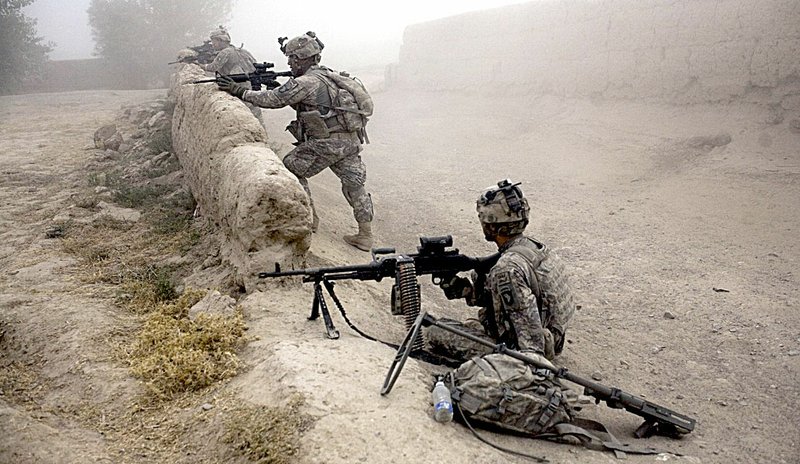KABUL, Afghanistan — The deaths of at least 66 soldiers, Marines, sailors and airmen have made July the deadliest month for U.S. troops in the nine-year war in Afghanistan. The tally includes six U.S. servicemen who died in four attacks in southern Afghanistan on Thursday and Friday.
The growing toll follows a sharp increase in the U.S. troop commitment that now stands at 95,000, along with a concerted effort by Taliban militants to slow major NATO offensives in the Taliban heartlands of southern Afghanistan. At least 265 U.S. troops have died this year. The website icasualties.org reported 63 U.S. deaths for July; a NATO official confirmed three additional U.S. deaths Friday.
NATO officials said two of the American service mendied in a roadside bombing while another was killed by a separate insurgent attack, all of them in southern Afghanistan, where the Taliban insurgency is strongest. The rudimentary bombs often made from fertilizer are a favored weapon of the Taliban and the predominant killer of U.S. troops in Afghanistan.
Interactive
The overall toll for NATO forces in July - 89 - is still below the high reached in June, when at least 103 NATO troops were killed.
With the addition of 30,000 U.S. troops this year, American commanders have predicted a spike in casualties, as they push into Taliban strongholds where there has been little coalition-force presence in the past. The summer months are typically the most violent in Afghanistan, when the Taliban are not hampered by cold weather in the mountains and can go on the offensive.
But there has also been a steady growth in the size and potency of the insurgency. U.S. and Afghan officials estimate that the number of Taliban fighters exceeds 30,000. Insurgents have spread beyond their traditional havens in southern and eastern Afghanistan in recent years and now hold considerable power elsewhere in the country, particularly in the once-peaceful north.
A senior NATO official said one-third to one-half of the 82 districts around the country that NATO considers crucial to the war are under insurgent influence.
Related story:
http://www.arkansas…">The Afghan struggle: A secret archive
The Islamic holy month of Ramadan, which begins around Aug. 11, may provide some respite in the bloodletting because Taliban fighters and Afghan government forces will be fasting, although some commanders believe the insurgents will keep up the pace in areas where the coalition is trying to step up their own operations.
Afghan casualties are rising as well, undercutting the support of Afghan society and complicating the military mission. In Kabul on Friday, a crowd of hundreds of Afghans rioted after a sport utility vehicle carrying U.S. Embassy contractors struck a car carrying Afghans, killing four of them, the Afghan police said.
The riot happened Friday afternoon on the busy road that connects the U.S. Embassy and military headquarters in Kabul with the city’s airport.
The crowd chanted “Death to America” and “Death to foreigners.”
Related story:
http://www.arkansas…">Strategic plans spawned bitter end for lonely outpost
Four contractors were in the vehicle, the embassy said. An Afghan police officer on the scene said the contractors traded fire with the police, but spokesmen from their company, DynCorp International, and the U.S. Embassy said that the contractors did not fire shots.
The mob raged while two vehicles rushed to the scene to evacuate the contractors, said police and witnesses. Two of the company’s SUVs were set afire. The DynCorp employees are working under a State Department contract.
According to a person briefed on the episode, none of the contractors were injured in the crash, but three suffered injuries in the riot; one suffered a concussion.
A statement from DynCorp said that the collision occurred after the Afghan vehicle “unexpectedly pulled in front of them,” and that the crowd attacked the contractors when they got out of their vehicle. That vehicle and one of the responding vehicles were the two burned, the statement said.
Some in the crowd grabbed fuel from a nearby store to set the vehicles ablaze, witnesses said.
“The people took 3 gallons of fuel from this shop,” said one teenage witness.
Half an hour after the crash, the Afghan police were still firing scores of rounds into the air to keep the crowd at bay. Witnesses said the crowd had tried to wrestle one police officer to the ground to take his weapon; some in the crowd overpowered police officers who tried to keep the crowd from setting the second vehicle on fire. Firefighters were also pelted with rocks and cursed.
Meanwhile, the U.N. Security Council on Friday removed five Taliban members from its sanctions blacklist, a move sought by the Afghan government to promote reconciliation.
Still, it was just half the number Afghan President Hamid Karzai was seeking.
The council committee monitoring sanctions against the Taliban and al-Qaida said all those taken off the list worked for the Taliban regime, which ruled Afghanistan for five years before it was driven out in the U.S.-led invasion at the end of 2001.
The committee identified those delisted as former U.N. Ambassador Abdul Hakim Mujahid Muhammad Awrang; former Deputy Minister of Mines and Industries Abdul Salam Zaeef, who wrote My Life with the Taliban; Abdul Satar Paktin, who worked in the Foreign Ministry and wasdeputy minister of health; and two members described as “deceased,” former Deputy Interior Minister Abdul Samad Khaksar and the former governor of Bamiyan province, Muhammad Islam Mohammadi.
The sanctions committee said 135 Taliban members remain on the list and are still subject to an asset freeze and travel ban.
Earlier this month, Staffan De Mistura, the top U.N. envoy in Afghanistan, said Afghan officials submitted 10 names for delisting that were forwarded to the sanctions committee.
Information for this article was contributed by Richard A. Oppel Jr. and Mujib Mashal of The New York Times, by Joshua Partlow of The Washington Post and by Robert H. Reid, Amir Shah, Monika Mathur, Edith M. Lederer and Deb Riechmann of The Associated Press.
Front Section, Pages 1 on 07/31/2010
